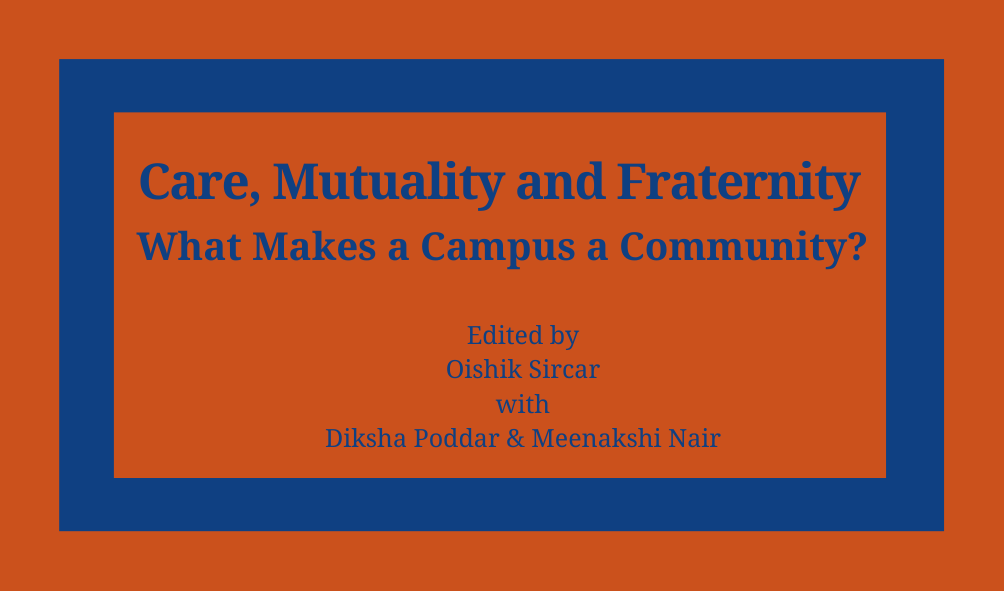
The Covid19 pandemic has required us to physically distance and isolate. It has required us to alter ‘normal’ life and compelled us to reflect on ourselves, the communities to which we belong, and the institutions with which we interact.
For students, academics, university administrators, and contracted staff, it is the university campus that is one of the primary organizers of life. They have had to contend with working from home, access to online classes, academic deadlines, and access to resources. It has been challenging to come to terms with the absence of the familiar campus, moving back to often unsafe home spaces, drastically reduced incomes, and heightened degrees of health anxiety.
Some universities, some administrators, some teachers, and some students have been able to work towards caring policies, whether at an individual or institutional level. For the most part, the university has been struggling to extend care to the people that live in, work in and engage with campus life. Fees still remain, deadlines are strict, allowances are made only grudgingly, and jobs are in peril.
This has made many of us reflect on the nature of universities and campuses from before the pandemic – was there ‘care’ in the everyday life of the university campus in a pre-pandemic time? Indeed, we have had to reflect on whether the campus can, in fact, be a community. It depends on what we understand to be a campus, and what we understand to be a community.
Is a campus a place where knowledge is imparted in one direction, from powerful teacher to supplicant student? Is it where knowledge is produced only for those within the campus? Is it accessible – both formally and substantively – only to those with economic and cultural capital? Is it where students pay to consume education as a good or service? Is it where degree-holders are produced as in an assembly line, indistinguishable from one another?
Or can there be a more radical understanding of the campus?
Can it be a space where teachers and students are co-producers of knowledge, each able to learn from the other? Can it be a space that is embedded within society, as opposed to abstracted from it? Can it engage with and shape – and in turn be shaped by – the society within which it functions? Can it be a transformative space that foregrounds collaboration, compassion, and commitment?
The first kind of campus implies a hierarchical community, one that is exclusionary. Here, knowledge is power, transacted to ‘produce’ graduates. The second sees the campus as being a space for shaping people who exist within complex networks of identity, politics, and the economy. It conceives the campus as capable of both shaping people, as well as being shaped by people.
In the latter kind of campus, how do we reimagine care, mutuality, and community as what B.R. Ambedkar called forms of “associated living, or conjoint, communicated experience”? Given the gendered nature of all university spaces, does the responsibility of care disproportionately fall on women? How do we think with feminisms to advance this idea of fraternity on campuses? What do we make of campus life when student politics are closely watched and violently policed?
We are aware of mass-scale progressive students’ mobilizations that attempt to maintain at great peril to lives and futures the spirit of fraternity as the foundations of university community. At Log-in Gender, we invited reflections on the ordinary and everyday forms of resistances, negotiations and strategies that students and teachers use inside classrooms, hostels, dining halls, canteens, common rooms, corridors, toilets, laboratories, among others, to practice—despite the challenges—a community life on campus marked by care, mutuality and fraternity.
This is a collection of some of those reflections, including poetry, that engages with campus cultures that – to devastating effect – imagine people’s private and professional lives as separate; and with educational content and pedagogic practice that is rigid and foregrounds strict binaries. This collection includes a reflection on sexual assault on college campuses – and the consequent need for safe and brave spaces in order to heal trauma and envision a safer future. One contributor reflects on the ideal of the campus, while another charts the care they received and participated in while on campus. Two others reflect on the transformative impact of the public university they attended.
Above all, this collection reflects – from the perspective of students and young professionals – a belief in and a commitment to the campus as having the potential to be a community in which care is practiced and centred.
Click below to read each reflection!
Teachers’ Lessons by Palashi Das
Jawaharlal Nehru University: A community of hope, fraternity and learning through acceptance by Tanika Singh and Neha Wadhwa
What do you want to be in the future? by Swastika Jajoo
Opposites by Catharine Ananova
The Dichotomy of Campus as a Community by Aafiya Bhat
Edited by: Oishik Sircar with Meenakshi Nair and Diksha Poddar
Oishik Sircar is Associate Professor, Jindal Global Law School, Adjunct Fellow, University of Technology Sydney Law School and Associate Member, Institute for International Law and the Humanities, Melbourne Law School. Oishik completed an LLB from the ILS Law College, Savitribai Phule Pune University, an LLM from the Faculty of Law, University of Toronto and a PhD from Melbourne Law School, The University of Melbourne. Oishik’s broad research interests are in the areas of critical jurisprudence, cultural studies of law, queer theory, postcolonial feminism, visual cultures, Marxism and, law and social movements.
Meenakshi Nair has recently completed her Masters in Comparative Literature at SOAS, University of London after studying English Literature at the Lady Shri Ram College for Women, University of Delhi. She is interested in the cultural imagination of the (South Asian) city and questions of English literature curriculum and pedagogy in India. Her poetry is published or forthcoming in Nether Quarterly, Qissa, and Porridge Magazine.
Diksha Poddar is associated with WISCOMP as a Consultant and has been administering Log-in Gender since its inception. She is currentlypursuing her doctoral research at Jawaharlal Nehru University, New Delhi. MPhil in South Asian Studies, Diksha has completed her Masters in Development Studies from Ambedkar University, Delhi and graduation in Political Science and Economics from Lady Shri Ram College for Women, University of Delhi.
